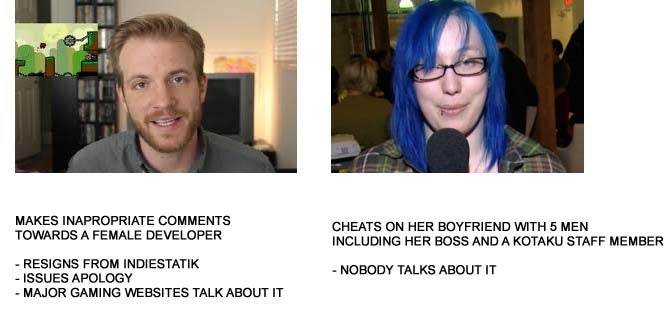The gaming community has unleashed a stream of vitriol and harassment against feminist gamer Zoe Quinn thanks to a tell-all blog post made by a jilted ex-boyfriend.
Allegations made by Quinn’s ex have brought about an Internet maelstrom, a sustained campaign of harassment—again—against Quinn and her family, and widespread accusations by gamers that Quinn’s alleged personal relationships are a sign of corruption in the gaming industry.
Thing is, there are no publicly known facts to support this theory. There is, however, a lot of hot air.
On Saturday, gamer and coder Eron Gjoni, who dated Quinn during the time she created Depression Quest, detailed his alleged history as Quinn’s then-boyfriend in an extensive blog post.
“[T]his is written almost entirely in shitty metaphors and bitter snark,” he wrote. “It’s a post about an ex.” Gjoni then goes on to allege that Quinn slept with other professionals in the gaming industry while they were dating.
Despite its length, Gjoni’s post amounts to little more than the kind of nasty, post-breakup gripes spurned partners lament about with close friends. But thanks to a number of key factors, his allegations have turned into a hot-button issue for a certain sector of the gaming community, which has twisted Gjoni’s dirty laundry into a narrative of industry corruption—a tale that is not based on provable fact.
While Gjoni does not directly accuse Quinn of using sex to advance her career, he implies that her relationships with the man for whom she later worked and a gaming journalist may have been ethically murky.
Mostly, however, Gjoni’s blog post portrays Quinn as dishonest. Gjoni ultimately concludes that Quinn was attempting to keep him from going public about her alleged indiscretions—with what seems in retrospect to have been good reason, given the number of gamers who have subsequently harassed her ever since the post went up.
All week, gamers have accused Quinn of trading sexual favors for career advancement from industry professionals and positive reviews from gaming journalists. Despite the lack of evidence for either of these claims—again, Gjoni’s post never makes either allegation, and the gaming journalist he names never reviewed Quinn’s game, Depression Quest—the idea has taken firm hold within the gaming community.
As Youtuber Triox points out in his response video, part of the reason gamers are so angry about Quinn’s alleged ties to industry journalism is that many of them seem to hold industry journalism responsible for making Depression Quest unfairly popular to begin with.
Depression Quest is an award-winning text-based choose-your-own-adventure game. But while it received nearly universal positive reviews from professional critics who praised it for immersing players in the difficult experience of depression, many gamers saw it differently.
“The few mechanics used are simple yet effective, but it’s apparent Quinn has never been to a creative writing workshop,” wrote one gamer in April. With its rudimentary graphics and simplistic mechanics, many gamers felt that Quinn’s success was illegitimate. They agreed with Triox that Quinn’s game only shot to prominence after Quinn claimed to have been harassed during the game’s development. Gaming outlets rushed to publicize Quinn’s allegations—she claimed to have had to change her phone number due to harassment—which helped to eventually secure Depression Quest a place on Steam.
It appears that in the eyes of these gamers, the journalists who supported Quinn or her game are somehow helping to rig the system for feminist members of the gaming community. One Escapist forum thread on the subject was entitled, “Zoe Quinn, or how video game media may have been exposed as a pro-feminist hugbox” before being renamed.
“She was supported by the gaming press and by other certain indie developers … against these hordes of horrible, horrible trolls that were apparently trying to keep her down,” stated YouTube user InternetAristocrat in a video uploaded Monday. Quinn seems to have rapidly become a symbol for gamers about the perceived hypocrisy in gaming towards women who herald concepts of social justice. On Tumblr, user alexxdz offered this comparison:

When Josh Mattingly said some awkward and innapropriate shit to a female developer everyone was talking about it, if you google his name the first page will have articles by Kotaku and Rock Paper Shotgun.
Now that some dirt about Zoe Quinn and a Kotaku staff member showed up suddenly privacy is a big deal.
Of course, there’s an obvious difference. Mattingly exploited a massive gender divide between industry pros while sexually harassing a female game developer, and he did it on social media, via his Facebook account. Quinn’s greatest sin appears to be having alleged private relationships with other men in the industry.
Another obvious difference is that while these women may get support from members of the industry and the media, they often have to endure extreme harassment from gamers simply for being women within the community. MundaneMatt’s video claimed that feminists within the gaming community were “put on pedestals,” and that Quinn’s relationships revealed the “incestuous” nature of the indie gaming community. He named Quinn and the much-maligned Anita Sarkeesian as examples. But Quinn and Sarkeesian could be poster children for the harassment women in the industry are forced to regularly endure. Sarkeesian especially is an example of a feminist within the community who has endured an intense amount of backlash from the gaming community, including death threats and real-life harassment, because of her work.
Trolling, sustained campaigns of harassment, intense vitriol, and a rhetoric on the part of the harassers of being conspired against by mainstream media—these are all familiar parts of the misogyny that various women in the gaming community have endured in recent years. From the sidelines, it’s hard to see that the current controversy over Quinn is any different from the previous controversies that have hounded women who attempt to maneuver within the culture.
Adding to the chaos is that Quinn allegedly tried to suppress some of the responses about her private life from being made public. Quinn allegedly issued a copyright claim against a video made by a YouTuber named MundaneMatt; however, mirrored copies of it are making the rounds. Another website, Games Nosh, was temporarily taken offline altogether after its domain host asked it to take down a blog post, screengrabbed here, about the Quinn scandal:
Host wants us to remove the article. Seeing if we can find a workaround to satisfy them.
— GamesNosh (@GamesNosh) August 19, 2014
Though the site the site is now back online, Quinn’s supporters have done her no favors by attempting to suppress the conversation around her sexual exploits.
Many male gamers viewed Quinn’s alleged takedowns as continuing her alleged pattern of suppressing information about her private sexual activities in order to boost her career.
But even Quinn’s own alleged use of copyright to have content taken offline is itself a tactic that redditors and other gamers themselves used to briefly silence Anita Sarkeesian—a tactic seen as useful, rather than deplorable, when it was in the hands of angry male gamers instead of women who challenged them.
And the gamers are angry. 4Chan‘s /v/ imageboard allegedly briefly hacked Quinn’s Tumblr in an attempt to get her real-life contact details, along with stealing alleged nude photos of Quinn from a private server. They’ve also flocked to Metacritic to bombard her game with negative reviews. (Reviews for the game are currently removed from Steam.)
In a Tumblr post, originally deleted during the hack and then reposted, Quinn detailed the litany of harassment she and her relatives had been subjected to as a result of the latest wave of harassment. After asking that members of the gaming press “be respectful of what IS a personal matter, and not news,” she elaborated:
The idea that I am required to debunk a manifesto of my sexual past written by an openly malicious ex-boyfriend in order to continue participating in this industry is horrifying, and I won’t do it. It’s a personal matter that never should have been made public, and I don’t want to delve into personal shit, mine or anyone else’s, while saying that people’s love and sex lives are no one’s business. I’m not going to talk about it. I will never talk about it. It is not your goddamned business.
….
This is another example of gendered violence, whereby my personal life becomes a means to punish my professional credentials and to try to shame me into giving up my work. I’m still committed to doing my small part to create a world where no woman is at risk of experiencing this. That said, I am thankful that even boards with a reputation for being the most hostile places online have been able to tell the intent behind these threads and banned them outright, seeing the hate speech for what it is, and not-news for what it is.
Among the “boards with a reputation” to which Quinn refers are 4chan’s /r9k/ board and Reddit, both of which have seen moderators deleting threads devoted to doxing Quinn’s information, in some cases incorrectly. Reddit has subsequently exploded into chaos over accusations that moderators of r/Gaming have allegedly deleted thousands of comments about the Quinn scandal, and turned the forum onto auto-delete in order to clear out the rest.
Redditors have further accused the subreddit r/PCgaming of similarly blocking discussion of the thread.
In response, redditors have flooded the r/gaming thread, spamming it with over 20,000 comments within seven hours after it was created. After realizing that one of the r/Gaming mods had spoken to Quinn directly on Twitter, redditors screamed for his removal, only to get back a frosty response.
Meanwhile, other industry professionals are emerging to speak out, both on behalf of Quinn and in condemnation. Gaming commenter John Bain, known to the Internet as TotalBiscuit, took to Twitter for a lengthy take on the subject, simultaneously castigating the hearsay and rumor surrounding the issue, and criticizing Quinn’s alleged use of DMCA takedowns to censor discussion.
Others were more blunt:
I am so horrified by the treatment of Zoe Quinn, and the despicable hypocrisy of these foul bigots who pretend it’s about “ethics”.
— John Walker (@botherer) August 19, 2014
Ultimately, the outcry over Quinn seems to bear out her initial fear, expressed to Gjoni months ago: “A woman’s sexuality at all being public can sink that fucking ship.”
Gjoni’s initial post may give evidence that Quinn is a bad girlfriend, but it doesn’t prove that Quinn had any intention to sleep her way into a job at Framed. Nor does it prove that Quinn traded sexual favors for positive reviews.
Instead, Zoe Quinn’s private sex life has gotten caught in the crossfire of the ongoing tensions over gender inequality in gaming culture. And while Quinn’s alleged attempts to suppress conversation about her sex life may have drawn that conversation further out into the public, the harassment she’s received in response has overshadowed anything she might have done to try to pre-emptively ward it off.
Ultimately, it seems likely that the noise surrounding this incident will serve as yet another example of the ways in which gaming culture continues to be a threatening place for women.
Correction: The original version of this article failed to indicate that Mattingly’s post was made on his private Facebook account. We regret the error.
Photo via Wikimedia Commons (CC BY-SA 2.0)


